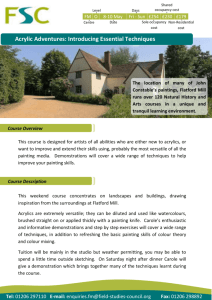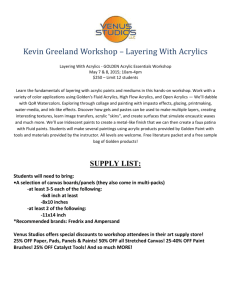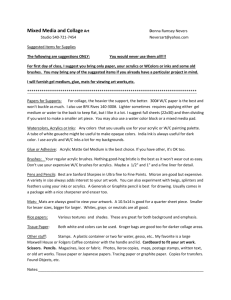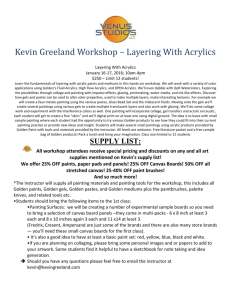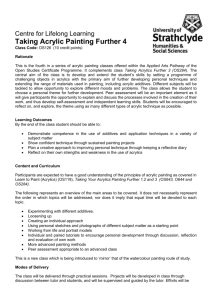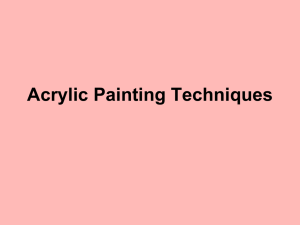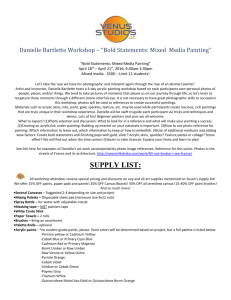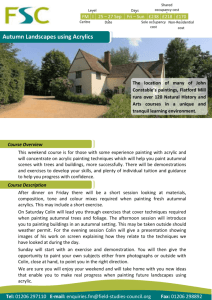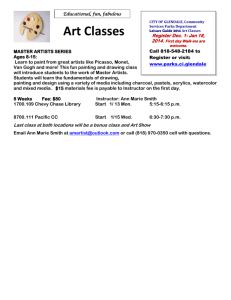Full Course Details - Field Studies Council
advertisement
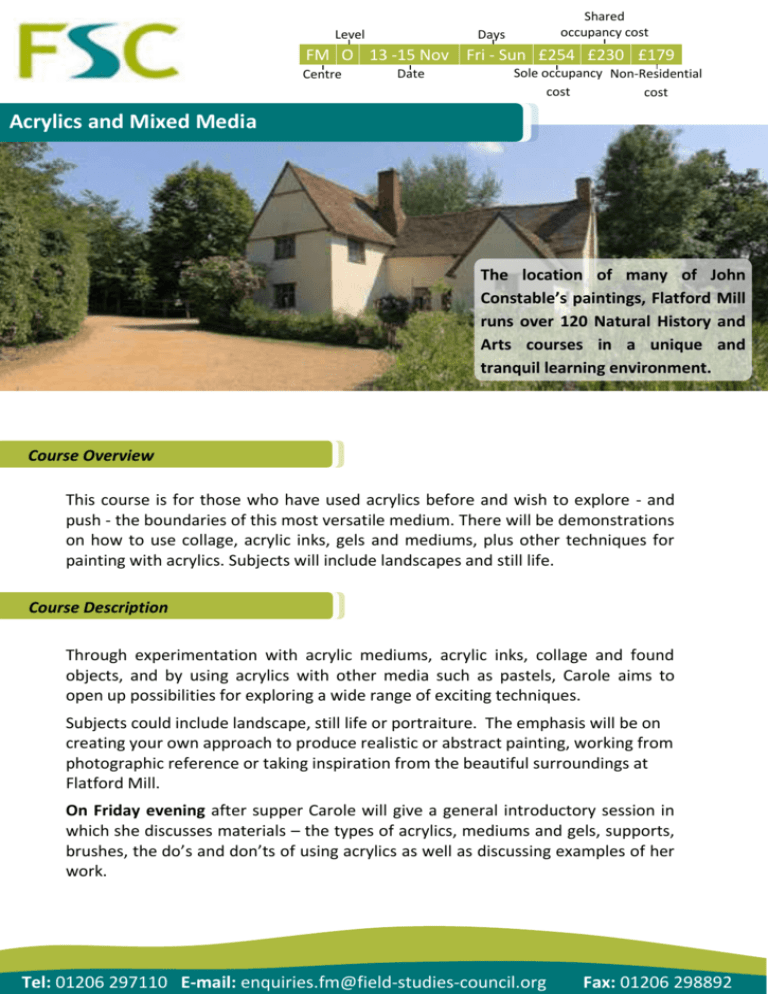
Level Shared occupancy cost Days FM O 13 -15 Nov Fri - Sun £254 £230 £179 Centre Date Sole occupancy Non-Residential cost cost Acrylics and Mixed Media The location of many of John Constable’s paintings, Flatford Mill runs over 120 Natural History and Arts courses in a unique and tranquil learning environment. Course Overview This course is for those who have used acrylics before and wish to explore - and push - the boundaries of this most versatile medium. There will be demonstrations on how to use collage, acrylic inks, gels and mediums, plus other techniques for painting with acrylics. Subjects will include landscapes and still life. Course Description Through experimentation with acrylic mediums, acrylic inks, collage and found objects, and by using acrylics with other media such as pastels, Carole aims to open up possibilities for exploring a wide range of exciting techniques. Subjects could include landscape, still life or portraiture. The emphasis will be on creating your own approach to produce realistic or abstract painting, working from photographic reference or taking inspiration from the beautiful surroundings at Flatford Mill. On Friday evening after supper Carole will give a general introductory session in which she discusses materials – the types of acrylics, mediums and gels, supports, brushes, the do’s and don’ts of using acrylics as well as discussing examples of her work. Tel: 01206 297110 E-mail: enquiries.fm@field-studies-council.org Fax: 01206 298892 During Saturday evening there will be a demonstration. On Sunday Students may want to spend a little time sketching outside (depending on the weather) and then develop one of these sketches into a painting, or continue with paintings started on Saturday. At the end of the day there will be a group appraisal. Please bring sketchbooks or suitably inspiring photographs for reference. About the Tutor Carole Massey has been a professional artist for many years and has tutored courses at the FSC for over 10 years in addition to painting holidays in Europe. She has appeared on many regional TV arts programmes and has written six teaching art books as well as articles for various art magazines. “Drawing Masterclass – Portraits” is her latest book, published by Search Press. Carole is a Professional Associate of the SAA demonstrates widely to Art Societies. She works in a variety of media and her own work includes portraiture, still life and landscapes. She lives in Brittany, France. Painting with Acrylics: Exploring Their Full Potential On Saturday we work on a range of exercises to explore a variety of techniques for using acrylics, in both conventional and experimental ways. Through step-by-step demos Carole shows you what you can achieve with this exciting medium; students then work on their own choice of subject. What to Bring Paints - Artist quality or good student quality such W&N Galeria, Daler Rowney System 3 or Liquitex student range Lemon Yellow Cadmium Yellow Medium Hue Yellow Ochre or Raw Sienna Burnt Sienna Ultramarine Phthalo Blue or Indanthrene Blue or Process Cyan Cadmium Red Hue Permanent Rose or Alizarin Crimson Dioxazine Purple Titanium White Mixing White (Zinc White) optional Blending or glazing medium (also suitable to use as glue) Any acrylic gels or mediums you have Bring what you have and are used to working with but if you are thinking of restocking, you may like to consider the range of colours listed above. Tel: 01206 297110 E-mail: enquiries.fm@field-studies-council.org Fax: 01206 298892 Paper/Board - A4 or A5 cartridge pad or sketchbook for sketching An A3 Galleria Acrylic pad (or suitable acrylic paper or board) or *Bockingford watercolour paper 140lb, 300gsm, semi rough (NOT) Palette - A ‘stay wet’ palette, specifically designed for acrylics. If you would like to make your own ‘stay wet’ palette, please bring a metal or plastic tray approx 11” x 7”, kitchen roll, several sheets of greaseproof cut to fit, and some cling film. Other materials 2B pencil masking tape an eraser kitchen roll a painting knife a charcoal pencil an old shirt or apron to protect your clothes a small water spray bottle or mister PVA glue or glazing or blending medium Textured mediums eg modelling paste etc Painting with Acrylics: Exploring Their Full Potential Painting with Acrylics: Exploring Their Full Potential Brushes - Please bring at least 6-8 good quality brushes so that you have small, medium and large, in the size range 2-12, synthetic and bristle, round, filbert and/or flat. In addition you may like to bring acrylic inks, soft pastels, pastel paper and textured, coloured or tissue papers suitable for collage work. The Centre provides drawing boards. We also have small sketching stools and easels for hire at a small charge if required. If you would like to discuss the course content or materials further, you may contact Carole Massey on the following email address: carole.massey@wanadoo.com or phone 0033 296 30 37 41. You may also like to visit her website at www.carolemassey.com Start and Finish times Afternoon tea is available from 1600 on Friday, but the first formal activity is dinner at 1900 (with the bar open from 1845!) Residents: Please aim to arrive between 1600 and 1800 on Friday to allow us sufficient time to show you to your accommodation and around the communal areas. Non-residents: You do not need to arrive quite so early but please can you be here by 1800 as we need to show you the communal areas as well. The course will end at 1600 on Sunday. Tel: 01206 297110 E-mail: enquiries.fm@field-studies-council.org Fax: 01206 298892 What is included in the fee Residential course fee includes: Full board accommodation including cooked breakfast, picnic lunch, homemade cakes and an evening meal. Vegetarian and other dietary option available. Up to 8 hours teaching time a day, plus relaxing breaks for meals and refreshments. Tea and coffee making facilities available throughout the day. Use of resources including library, workrooms, studios and the Centre grounds. Transport during the courses. Insurance to cover cancellation, personal belongings, personal accident, legal liability and medical emergency. If you choose to be a non-resident on a residential course, the fee will include all the above except accommodation and breakfast. How to book Bookings can be made by telephoning the Centre; we are open 0930 – 1700 weekdays and most weekends. Alternatively, bookings can be made via our website: www.field-studies-council.org Tel: 01206 297110 E-mail: enquiries.fm@field-studies-council.org Fax: 01206 298892
